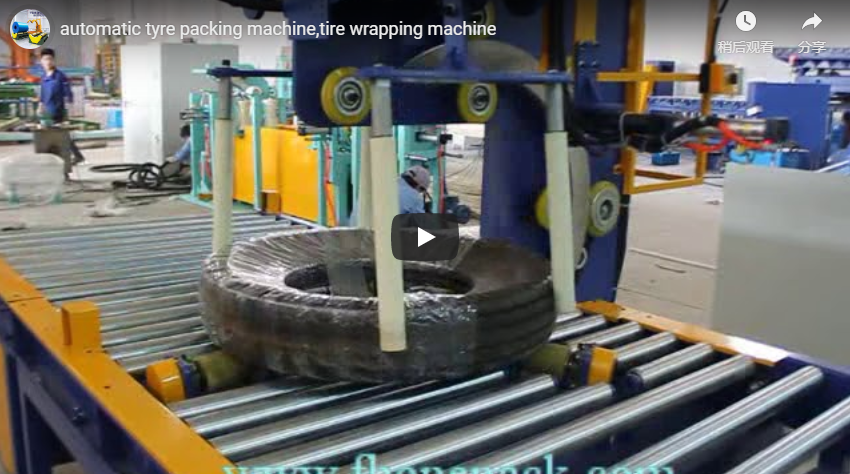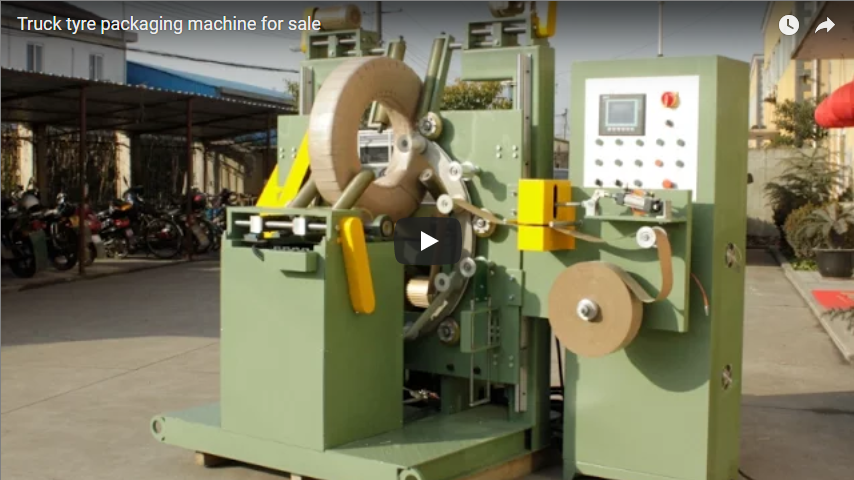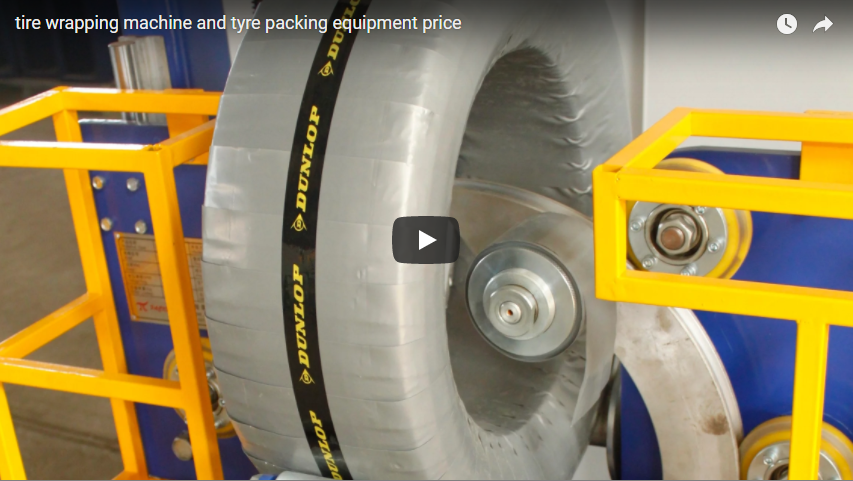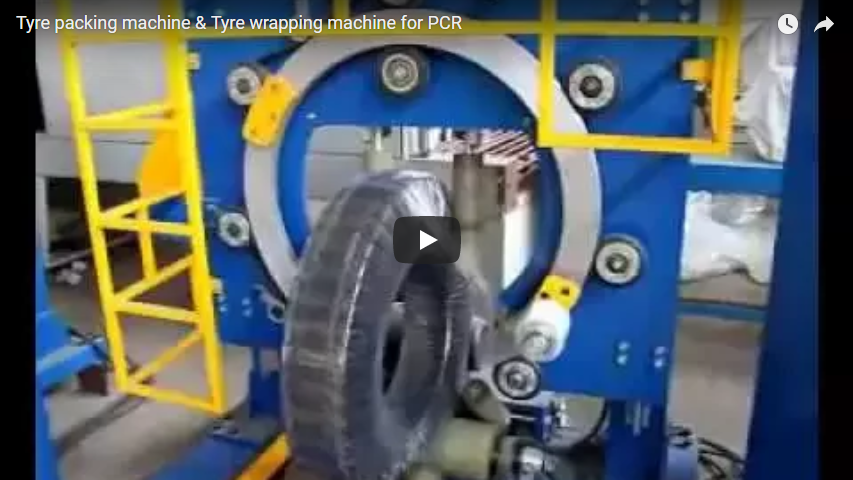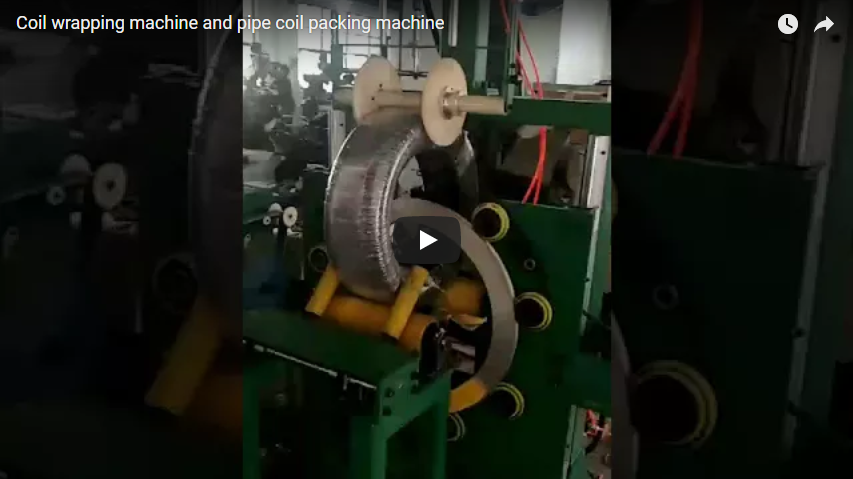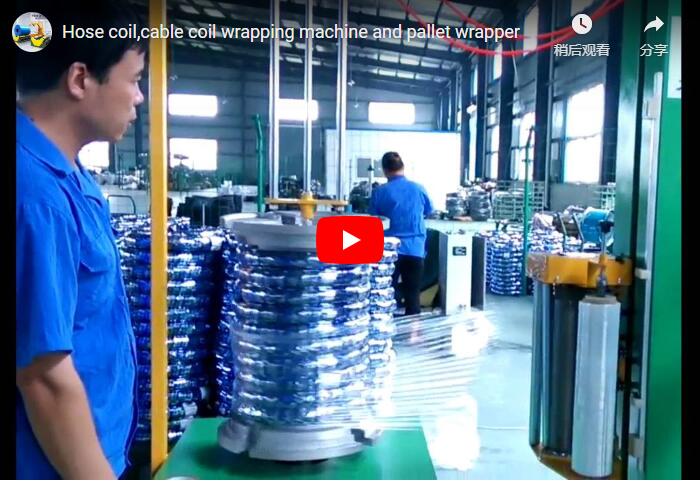Advanced Tire Wrapping Machine Design: Engineering for Speed, Efficiency, and Protection
Efficient and secure packaging is paramount in the tire manufacturing and distribution industry. Protecting tires from damage, dust, and environmental factors during transit and storage requires robust solutions. Modern automated tire wrapping machines represent a significant leap forward, offering superior performance compared to manual methods. This article delves into the design, components, technical specifications, and operational advantages of advanced tire wrapping machines, exemplified by the system showcased below.
1. Core Operational Principle: Horizontal Orbital Wrapping
At the heart of this type of machine lies the horizontal orbital wrapping mechanism. Unlike traditional pallet wrappers, these machines are designed specifically for ring-shaped or cylindrical products like tires, coils, and pipes.
- Process: The tire is fed horizontally, typically via a conveyor system, into the wrapping station. A rotating ring, carrying a roll of stretch film, orbits through the center of the tire and around its outer circumference.
- Result: This creates a tight, conforming layer of stretch film that covers the tire's tread and sidewalls, providing excellent load containment and surface protection.
- Design Philosophy: The primary goals driving the design include maximizing throughput (speed), ensuring consistent wrap quality, minimizing film consumption through efficient pre-stretching, enhancing operator safety, and offering flexibility for various tire sizes.
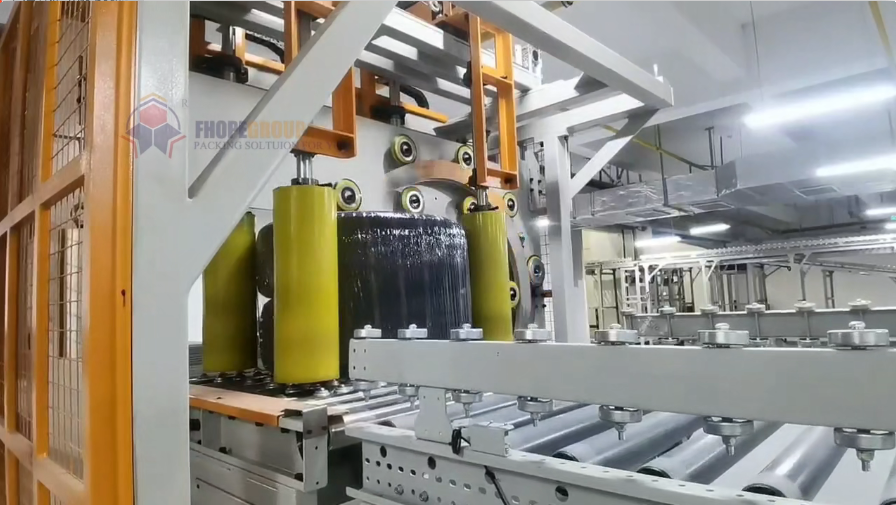
tyre packing machine 2. Key Engineering Components and Structure
A high-performance tire wrapping machine integrates several sophisticated subsystems:
- Main Frame: Constructed from heavy-duty welded steel for rigidity and vibration damping, ensuring stability during high-speed operation.
- Conveyor System: Motorized roller or belt conveyors manage the infeed and outfeed of tires. Speed synchronization with the wrapping cycle is critical for seamless operation. Variable speed drives (VSDs) are often employed.
- Rotating Ring Assembly: This is the core wrapping component. It must be precisely balanced for high rotational speeds (RPMs). It houses the film carriage and drive mechanism (typically gear or belt-driven).
- Film Carriage & Pre-Stretch Unit: This holds the stretch film roll. Crucially, it incorporates a powered pre-stretch system. This mechanism stretches the film before application (often up to 250-300%), maximizing film yield, improving load holding force, and reducing packaging costs. Sensors monitor film tension and presence.
- Automatic Film Cut & Clamp System: Automates the start and end of the wrapping cycle by clamping the film, wrapping the tire, then cutting and sealing/wiping the film tail. This eliminates manual intervention, boosting speed and safety.
- Control System: Usually managed by a Programmable Logic Controller (PLC) (e.g., Siemens, Allen-Bradley) integrated with a Human-Machine Interface (HMI) touch screen. This allows operators to:
- Select pre-programmed wrapping recipes for different tire sizes/types.
- Adjust parameters like ring speed, conveyor speed, number of wraps, film overlap, and tension.
- View diagnostics and machine status.
- Safety Features: Essential elements include safety fencing/light curtains around the wrapping zone, emergency stop buttons, interlocked access doors, and clear visual/audible warnings. Compliance with relevant safety standards (e.g., CE, OSHA) is vital.
3. Technical Specifications Overview
While specific parameters vary by model and manufacturer, typical technical data for modern tire wrapping machines include:
- Performance:
- Wrapping Speed: 40 - 90+ RPM (ring speed), translating to potentially 1-3+ tires wrapped per minute depending on size and wrap pattern.
- Throughput: Up to 180+ tires per hour.
- Tire Dimensional Capacity:
- Outer Diameter (OD): 500mm – 1500mm+
- Inner Diameter (ID): 200mm – 800mm+
- Width/Height: 100mm – 500mm+
- Stretch Film Specifications:
- Film Width: Typically 76mm, 125mm, or 250mm.
- Film Thickness: 17 - 35 microns.
- Roll Diameter: Standard core and outer diameter compatibility.
- Pre-Stretch Ratio: Adjustable, commonly up to 300%.
- Utilities:
- Power Supply: 380V/415V/480V, 3-Phase, 50/60Hz.
- Installed Power: 3 kW - 7+ kW depending on options.
- Compressed Air: Often required for clamp/cut mechanisms (e.g., 6 bar).
- Control:
- PLC: Major industrial brands.
- HMI: Touch screen, multi-language support.
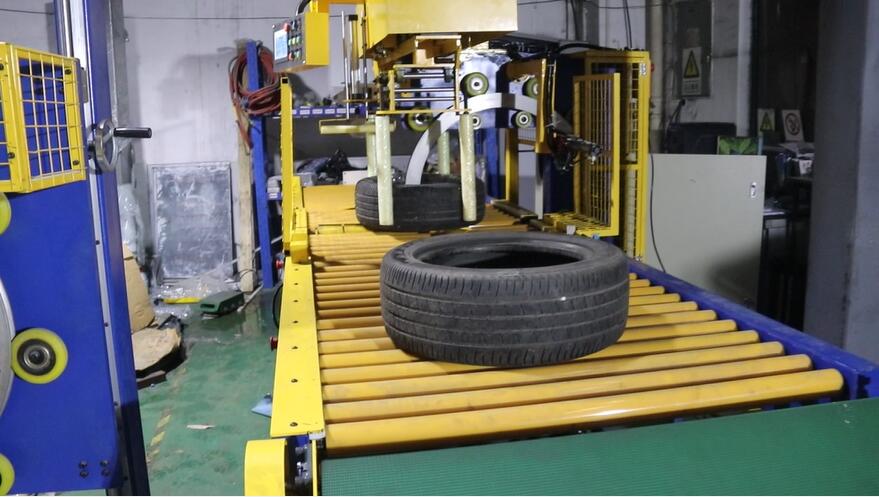
Tyre packing line 4. Advanced Features and Customization Options
Leading tire wrapping machines offer various enhancements:
- Variable Overlap Control: Allows precise adjustment of how much successive film layers overlap, optimizing material usage and protection level.
- Top/Bottom Sheet Applicators: For full 6-sided protection against moisture and dust, particularly for long-term storage or overseas shipping (though less common for individual tires vs. pallet loads).
- Integration Capabilities: Designed for seamless integration into fully automated production or logistics lines, communicating with upstream and downstream equipment (robots, conveyors, labeling systems).
- Specialized Wrapping Programs: Tailored cycles for different tire types (e.g., passenger car, truck, OTR) or packaging requirements.
- Data Logging & Reporting: Capturing operational data like cycle times, film consumption, and error codes for performance analysis and predictive maintenance.
5. Performance Analysis: Speed, Economy, and Protection
The shift from manual or semi-automatic methods to a fully automated orbital wrapper yields significant benefits:
- Increased Throughput: Drastic reduction in wrapping time per tire compared to manual methods.
- Labor Savings: Frees up personnel for other tasks, reducing direct labor costs associated with packaging.
- Material Cost Reduction: Powered pre-stretch significantly increases the yield from each roll of stretch film, leading to substantial cost savings.
- Consistent Quality: Automated control ensures every tire is wrapped to the same specification, improving load security and reducing transit damage.
- Enhanced Protection: Provides a tight, puncture-resistant layer protecting against dirt, moisture, and scuffing.
6. User Experience and Maintainability
Modern designs prioritize ease of use and maintenance:
- Intuitive HMI: Graphical interfaces simplify operation, parameter adjustments, and troubleshooting.
- Easy Film Loading: Ergonomically designed film carriages facilitate quick roll changes.
- Simplified Maintenance: Access points for routine checks (lubrication, sensor cleaning) are typically designed for convenience. Components known for wear (e.g., cutting blades, rollers) are often designed for straightforward replacement.
- Remote Diagnostics: Some advanced systems offer remote access capabilities for faster troubleshooting and support from the manufacturer.
Conclusion: A Sound Investment in Tire Packaging Automation
Automated horizontal orbital tire wrapping machines represent a sophisticated engineering solution tailored to the specific demands of the tire industry. Their exquisite design focuses on delivering high-speed operation, economic efficiency through material savings, and superior product protection. The ability to adjust parameters and select various options ensures adaptability to diverse user needs and tire types. Investing in such technology optimizes packaging processes, reduces operational costs, and ultimately safeguards valuable tire assets throughout the supply chain.
To explore specific models and configurations, you can learn more at www.fhopepack.com.

